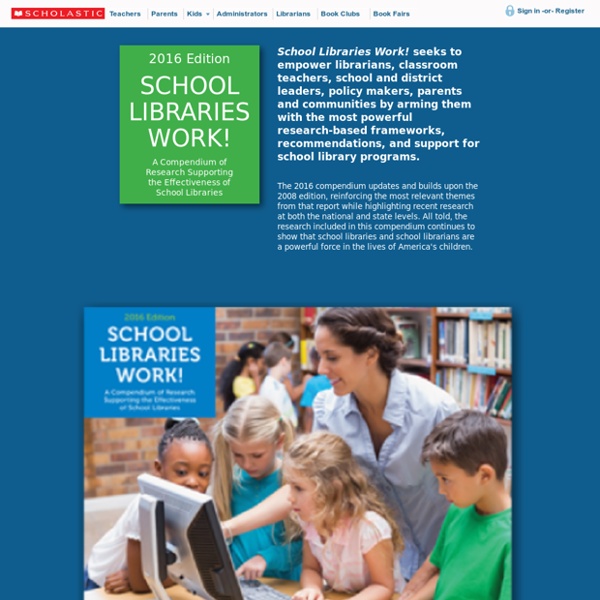



http://www.scholastic.com/slw2016/
Related: Effectiveness of School Libraries • drfees • Young people and studentsStudy: Good School Libraries Affect Test Scores Columbia, SC (WLTX) - A study released Tuesday by the South Carolina Association of School Librarians shows that the more emphasis is put on school libraries--and the learning that takes place there--the better scores students receive on standardized tests. University of South Carolina Professor Dr. Karen Gavigan outlined the studies five areas of importance at a press conference Tuesday morning. Fighting fake news by teaching neuroscience & social psychology (2020) Guest blog: Dr Graham Gardner, Librarian, Abingdon School Introduction From claims over the size of the crowd at Donald Trump’s inauguration to automated “bots” retweeting disinformation generated in the “fake news” factories of Macedonia, the spread of disinformation, misinformation and outright falsehoods had become integral to contemporary life. While “alternative facts” are in the ascendant, our collective capacity to shoot them down is sadly lacking. In the US, landmark studies in 2016 and 2019 suggest that the vast majority of citizens can’t separate “fake news” from “real”, or distinguish between straight journalism, advertising and political ads.
Why school librarians matter: What years of research tell us - kappanonline.org When schools have high-quality library programs and librarians who share their expertise with the entire school community, student achievement gets a boost. Since 1992, a growing body of research known as the school library impact studies has consistently shown positive correlations between high-quality library programs and student achievement (Gretes, 2013; Scholastic, 2016). Data from more than 34 statewide studies suggest that students tend to earn better standardized test scores in schools that have strong library programs. The Results Are In: Libraries Matter. — Room to Read Insider At Room to Read we are passionate about testing our assumptions. We do not want to take for granted that what we’re doing is valuable and effective, we want to be able to prove it and improve it. When it comes to our school libraries, it can be easily supposed that our libraries are enhancing children’s reading habits, but we wanted to test this assumption and find out more. Does having a library help make a child more likely to read for pleasure at school? And what about at home?
The Challenge That's Bigger Than Fake News (2017) Since the November 2016 presidential election, coverage of “fake news” has been everywhere. It’s hard to turn on the TV without hearing the term. Google and Facebook have pitched plans for fighting the menace.1 State legislators have even introduced bills to mandate K–12 instruction on the topic.2 Fake news is certainly a problem. Sadly, however, it’s not our biggest. Fact-checking organizations like Snopes and PolitiFact can help us detect canards invented by enterprising Macedonian teenagers,3 but the Internet is filled with content that defies labels like “fake” or “real.”
News Literacy by Michelle Luhtala and Jacquelyn Whiting - Libraries Unlimited - ABC-CLIO May 2018 Libraries Unlimited New! Paperback 978-1-4408-6152-9 $45.00 Add to Cart eBook 978-1-4408-6153-6 eBook Available from ABC-CLIOEmail ABC-CLIOorCall Your Preferred eBook Vendor for Pricing International Pricing Paperback: £35.00/38,00€/A$58.00 The importance of school libraries in the Google Age Kay Oddone In Australia, access to the internet is almost ubiquitous. In 2014–15, 85% of the Australian population aged 15 years and over were internet users, with 99% of people aged 15–17 using the internet (ABS 2016).
NewsWise evaluation report 2018-19 This report evaluates the impact of the first year of NewsWise – a free, cross-curricular news literacy programme for 9- to 11-year-olds across the UK, developed by the Guardian Foundation, the National Literacy Trust and the PSHE Association, and funded by Google. NewsWise aims to empower children from disadvantaged communities with the skills and knowledge to engage with and enjoy news, to feel confident to ask questions and to challenge misinformation, and to have their own values and opinions. Between April 2018 to April 2019: 2,476 pupils in 42 UK primary schools took part in face-to-face NewsWise workshops, giving children the chance to learn about news, improve their news literacy skills and prepare their own reports540 teachers received face-to-face training, helping schools support and embed news literacy across the curriculum3,520 resources and 703 units of work were downloaded by schools from the NewsWise website